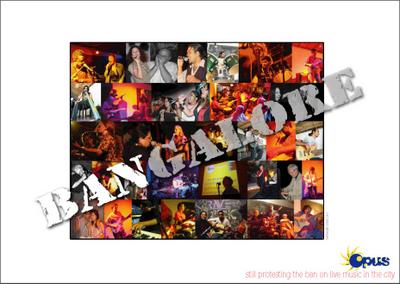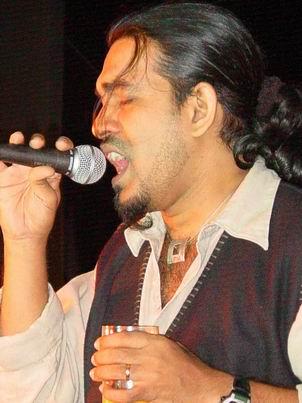
We have bomb blasts and bad infrastructure, but the government is busy banning dancing and music at nightspots. What’s going on?
TEJASWINI TIRTA
KILLED BY LIVE BANDS
The first blow to Bangalore’s afterhours scene was the 11.30 pm deadline which, police say, was due to safety concerns. Then came the second blow — singing and dancing was disallowed at places that serve alcohol. Finally, any place of public entertainment playing ‘loud’ music was asked to shut shop.
Bangalore now finds itself held to ransom by the banned live band association, which wants to be allowed to function in the city. Its stand is bolstered by a law that equates dance bars and prostitution to clubs, restaurants and practically any place playing music, serving alcohol and where people shake a leg. Ergo, no live bands, no nightclubs either. That’s the stand the authorities have chosen to take.
GOING BY THE LAW
A lot has been said about the Karnataka Police Act 2005 and the application of the law that terms clubs and pubs illegal. The law describes three forms of entertainment:
• Live band: A place of public entertainment where music — live or recorded — is played, with or without people singing or dancing or the existence of ‘cabaret’ or both.
• Cabaret: A form of dance performed in a place of public entertainment by dancers or artistes or any other person as part of musical entertainment.
• Discotheque: A facility provided at a place of public entertainment to customers or persons singing or dancing of whatever form or both.
CHANGE THE LAW
Going by these clauses, any form of singing or dancing at places of ‘public entertainment’ — from theatres, restaurants to fast food joints — can termed illegal. No wonder the police are going berserk shutting down any place that offers entertainment of any sort.
“Just like you can’t equate a pickpocket to a murderer and the IPC has various sections for different crimes, you can’t treat restaurants and clubs the same way you treat dance bars,” says Ashish Kothare, joint managing director of a city nightclub. “The government must reconsider the law and rephrase it to suit every vertical,” he says,
adding, “We’re also against dance bars and rave parties.”
LICENCE TO RAID
The police commissioner has retorted, saying that any joint can operate after obtaining a licence. But club owners counter that — since the law was made to put curbs on live bands, obtaining a licence is near impossible. “With over 20 NOCs from various government departments and rules like leaving 10x10 ft for parking and fire exits and noise levels left to the interpretation of the cops — all framed with the intention of stopping live bands from starting business — we can’t get permission to operate. Even if you have a licence, the police can still raid your establishment,” says Ashish.
Says Amardipta Biswas, who owns a lounge bar in Goa, “In other cities — Mumbai, Delhi or Chennai — the rules are strict and clear. You can serve liquor 24/7 if you obtain the right licence. You can dance if you don’t play loud music outdoors
and disturb the neighbours. In some foreign cities, nightlife is concentrated in one area, which is constantly under police surveillance. In the day, it functions like any other business street.”
PEOPLESPEAK
Enough is enough, the people of Bangalore have said and protested the absurd rules. In reaction to this protest and reports of police harassment, commissioner Shankar Bidari said, “The government isn’t run for the businesses of a few persons, it’s for the welfare of society.” So, BT asked Bangaloreans — not the “few business persons” but a crosssection — what issues they would like the government to focus on. The findings show that regulating nightlife isn’t a public concern (see box).
COP STORY
The police say they’re following and enforcing the Karnataka Excise Act of 1965 and another city-specific order brought out in 2005 to clamp down on places of public entertainment by insisting on licences. The fact is, they are also invoking the Karnataka Police Act, which allows them to raid any establishment that remains open after 11.30 pm, citing law and order.
But here is what former policemen have to say:
Youngsters easily outnumber older people in this city. While the police must enforce the existing rules, they should also consider suitable amendments, keeping in mind the lack of entertainment options for youth. They need some relaxation at the end of a working day.
BN Garudachar, former director general and inspector
general of police
The police act applies to all businesses and if an establishment has to stay open beyond 11.30 pm, it has to get the licence from the police. But the stand some police officers have taken on this issue is not right as they are trying to curb the nightlife of the city. In such a situation, the crime rate will only rise — contrary to their perception.
SN Borkar, former state DGP
No licence to chill
The police has asked clubs and discos to apply for a fresh licence in order to function. But it’s so wrapped in red tape, there’s no hope of dancing and music being restored
TEJASWINI TIRTA
POLICE commissioner Shankar Bidari has submitted a set of guidelines to the high court on issuing licences to entertainment units that want to run live bands and discotheques. The affidavit is said to contain 12 requirements nightspots must fulfil. These include submitting a layout plan approved by the BBMP, BDA and other civic agencies (read: running around babus all your life); a copy of the partnership deed for partner firms; title deeds; a certificate from the electrical contractor and the fire department (more babus); and of course, a demand draft of Rs 20,000 as licence fee (officially, that is).
The process of issuing the licence also involves the DCP (administration) checking the documents, then getting the premises inspected and submitting reports, etc. Of course, submitting reports at this point only seems like a distant dream for club owners.
“The police says from the day we apply for the licence, the process will take 36 days. But there’s no guarantee that we’ll get a licence after all this time,” says one restaurant owner. “I’ve been running around the commissioner’s office for four days and I can’t get an application form, forget a licence,” he rues.
The so-called guidelines are absurd, restaurateurs say. For example, the owners are supposed to submit an occupancy certificate from the BDA, a certificate that is non-existent for 99 per cent of the buildings in the city. And then there are the NOCs, which only mean the process is nothing but a maze of corruption and exploitation.
For every such issue raised by club owners, the police and home ministry respond with a, “We’ll discuss it or submit a representation.” “With every changing commissioner and government, we’ve discussed and submitted memoranda, nothing has happened,” says a club owner.
“We won’t go through this process of getting a licence. The rules treat us like dance bars. We’re not them,” says another restaurateur. “The police has framed rules that put dance bars, discos and restaurants in one category. We want to be treated separately, which is what happens in other cities. There’s a clear demarcation for different forms of entertainment and the process of getting a licence to run your business,” she says.
Discotheque and club owners stress that they are now fighting to change the law. “If the law is implemented as it is today, we’ll never get a licence. Simply because if they grant us a licence, they have to grant it to the live band operators as well. And it’s against state policy to allow live bands to function,” says the owner of a discotheque. Which means the only way Bangalore’s nightlife can get buzzing again is if the government allows live bands to function or changes the law.
“If a customer who comes to my club is not allowed to dance, he assumes that I’ve not got my licence or I’m running my place illegally, which isn’t true. Read between the lines. This is an attempt to kill the hospitality industry in the city, its tourism, and its image. Where will it stop? First you ban dancing, then music, drinking, smoking, behaviour, dressing, dance schools, weddings... all of which existed even before this government came into power. Does a government that comes into power for four years have the right to change the face of a city this way?” asks a club owner.
‘Bangalore is becoming regressive’
Dino Morea, Bollywood actor, Bangalore boy
THIS situation is ridiculous. With all the multinationals setting up base in the city, what kind of impression are the authorities trying to create? It’s like they are running a nursery school. Bangalore is supposed to be a progressive city, but I think it’s getting more and more regressive. People need to be able to go out and have some fun. Some recreational facilities, nightclubs and pubs don’t harm people or society in any way. There are bigger issues for the authorities to deal with other than shutting down discotheques.
AS TOLD TO LEENA GHOSH
AS TOLD TO LEENA GHOSH
For Reservations Call 080-23442580. go here for more details about OPUS ...
if u don't wish to be on this mail list pls click on Unsubscribe and send us a :( in the subject line




